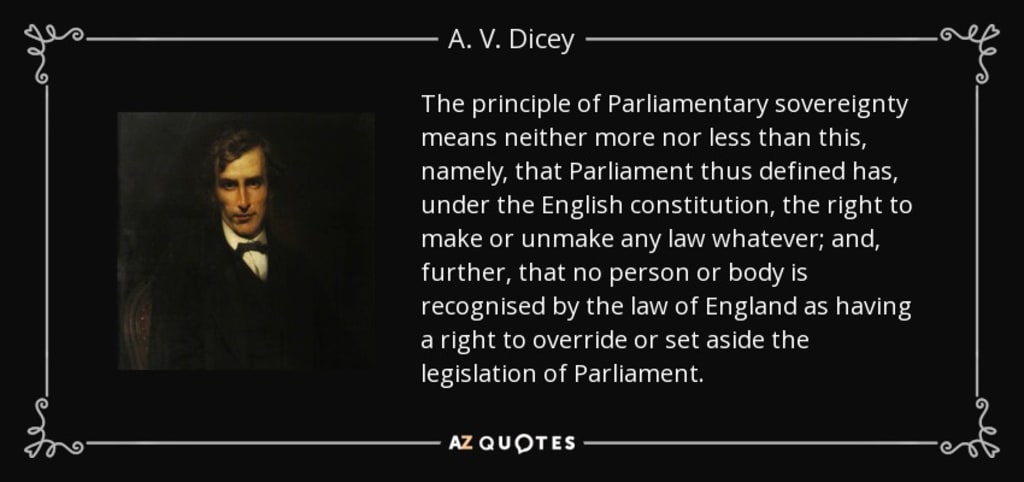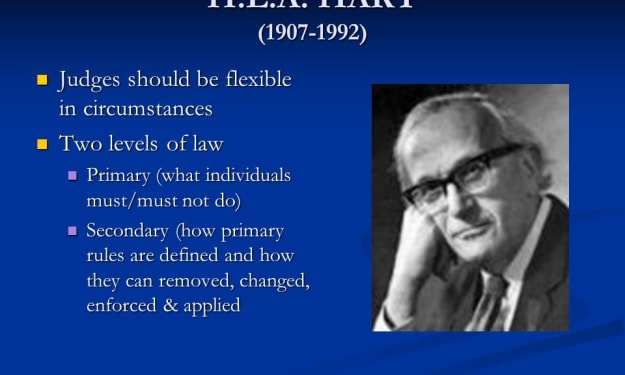Dicey’s Parliament in the 21st Century
Does the classic account of the doctrine of the supremacy of Parliament have any place in the modern United Kingdom?

‘…sovereignty is incompatible, both internationally and internally, with another concept which also has a lengthy history, but which today is widely regarded as a paramount value: the rule of law’. Professor Sir Francis Jacobs – The Sovereignty of Law: The European Way
“The classic account given by Dicey of the doctrine of the supremacy of Parliament, pure and absolute as it was, can now be seen to be out of place in the modern United Kingdom…” Lord Steyn in R (Jackson and Others) v. Attorney General
Introduction
Parliamentary supremacy is a concept that has evolved since the English Civil War – it is considered the dominant motif and foundation of British politics and was transported to colonial America and incorporated into the U. S. Constitution: "... All legislative Powers herein granted shall be vested in a Congress of the United States..."
In its simplest form, the doctrine of Parliamentary supremacy according to Dicey may be broken down into three sections:
- Parliament can make any law it chooses
- Today’s Parliament cannot bind tomorrow’s — unlike the US Supreme Court
- No valid Act of Parliament can be questioned in any UK court.
In the course of history — evolution and change is inevitable and Dicey’s classic version of the doctrine may no longer satisfy the needs of a modern day United Kingdom — or does it?
Modernization of Parliamentary Sovereignty
Parliamentary sovereignty precludes judicial review of any Acts passed by Parliament. However, certain events have modified the concept of Parliamentary sovereignty in the 21st Century which imposes some limitations on the doctrine — for example: devolution to Scotland, Wales, and Northern Ireland. Membership in the EU (soon to end), however, some would argue that the decision in Factortame leaves the doctrine absolute and intact and as Lord Bridge in his judgment, in that case, suggests: Parliament has chosen to exercise rather than surrender its sovereignty. The protection of certain Constitutional Statutes is yet another limiting factor — the case of Thoburn v Sunderland City Council, is on point — Lord Laws held that statutes of constitutional importance like the Magna Carta and the European Communities Act 1972 could not be repealed under the doctrine of implied repeal. Additionally, the Human Rights Act 1988 gives the courts the authority to issue a declaration of incompatibility whenever an Act of Parliament does not comport with the HRA.
Dicey’s pure doctrine of Parliamentary Sovereignty is still intact — however, it is limited in terms of political sovereignty — which may explain why some observers feel that his traditional doctrine is now "out of place" in a modern United Kingdom.
Judicial Challenges to Parliamentary Supremacy
There have been a number of challenges to the doctrine of Parliamentary Sovereignty in the 21st century. For our purpose, only three — in this writer’s opinion the most important — will be presented.
The first: A (and others) v Secretary of State for the Home Department [2005] HL. A case where evidence obtained by torture was disallowed became a huge embarrassment for the Government — because for the second time within the span of a year the judiciary had ruled against the government’s approach to terrorism — causing Lord Bingham to remark: "…I am startled, even a little dismayed, at the suggestion (and the acceptance by the Court of Appeal majority) that this deeply-rooted tradition and an international obligation solemnly and explicitly undertaken can be overridden by a statute and a procedural rule which make no mention of torture at all."
The second and for our purposes the most significant — in that it involved challenges to the Parliament Acts of 1911 and 1949 is, Jackson v Attorney General [2005].
Only Bills prolonging the length of a Parliament past five years – private Bills — Bills sent to the Lords less than a month before the end of session and Bills originating in the Lords are not subject to the Parliament Acts of 1911 and 1949.
The Parliament Acts have been used since 1949 — to place — the War Crimes Act 1991 allowing prosecution of Nazis accused of murder during WWII — the European Parliamentary Elections Act 1999 introducing the list system to choose candidates — and the Sexual Offences (Amendment) Act 2000 lowering the age of consent to homosexual acts to 16 — into the Statute Book.
The mandatory conditions that must be met in order to invoke the Acts are: the Bill must originate in the Commons — there must be a minimum of one year between the second reading in the first session in which it was rejected by the Lords and passing by the Commons in the second — the Bill must be identical to the one rejected by the Lords.
The significance of Jackson is that in this case both the 1911 and 1949 Acts were ruled lawful. The constitutional importance of this case is reflected in that nine of the twelve Law Lords sat on the case instead of the usual five. The argument presented by Countryside Alliance was that the 1949 Act was used to force the banning of fox hunting in England and Wales and that the government that last November had used the Parliament Act — over the continuous opposition in the Lords to make hunting with dogs a criminal offence. Lord Bingham giving the opinion of their Lordships held that this was valid — expressing that legislation based on the Parliament Acts is not subordinate but primary legislation.
Two years later R (Countryside Alliance and others) v HM A-G (2007) AC claimed the Hunting Act 2004 violated HRA 1988 and EU law. In this case, Lord Bingham said that the law was in accordance with the Constitution and should not be undone by an interest group. "The democratic process is liable to be subverted if, on a question of moral and political judgment, opponents of the act achieve through the courts what they could not achieve in Parliament." Consequently, the appeal against the Act failed for a second time.
Our take away from these cases — in this writer’s opinion — is that the doctrine of Parliamentary Sovereignty that Dicey envisioned has survived into the 21st Century — albeit with certain expected evolutionary modifications — cited above.
Rule of Law and the Consent of the Governed
In his monograph "The Rule of Law" the late Lord Bingham points out that "the Constitutional Reform Act 2005 provides, in section 1, that the Act does not adversely affect ‘(a) the existing constitutional principle of the rule of law; or (b) the Lord Chancellor’s existing constitutional role in relation to that principle." Under section 17(1) of the Act the Lord Chancellor must, on taking office, swear to respect the rule of law and defend the independence of the judges.
The difference between a law and a statute is a law — that is the common law derived from the consent of the governed — applies to all equally — on the other hand –— statutes can and are made in favor of special interest groups of limited demographic. If statutes were laws they would be called "Laws of Parliament" not "Acts of Parliament." The Magna Carta became codified into the Statute Book in 1225. The Magna Carta was all about the clergy, the guilds, and the barons — in the aggregate comprising about 25 percent of England’s population at the time — the remaining 75 percent being unaffected by it and not consenting to it — simply ignored it. The significant part of the Magna Carta that remains in force today is that the monarch is not above the law — as Lord Edward Coke declared in Parliament in 1628, "…Magna Carta will have no sovereign…"
The consent we speak of requires that it be given by the individual — not by a legislative body on behalf of that individual — the result would be a minority dictatorship. If you have to do as you’re told, there is no freedom in it. It is the individual who must enjoy the absolute right to give or withhold consent. This concept of individual freedom is the basis of our Constitution.
In this view the pure concept of the doctrine of Parliamentary Sovereignty of Dicey has survived into the 21st Century with limitations on that Sovereignty noted above including but not limited to the concept that, once made, Acts of Parliament are not subject to special interests — reinforced by Lord Bingham’s statement in R (Countryside Alliance and others) v HM A-G (2007) AC that "The democratic process is liable to be subverted if, on a question of moral and political judgment, opponents of the act achieve through the courts what they could not achieve in Parliament."
Conclusion
Parliamentary Sovereignty, excluding judicial review, has in modern times, with devolution, EU membership and HRA 1988 been modified to keep abreast of the times. Although Dicey’s pure theory is still for all intents and purposes intact, some observers like Lord Steyn seem to argue that it may be out of step in modern times.
There have been judicial challenges to the doctrine some of which favored Parliament expressing that Acts of Parliament grounded in the Parliament Acts of 1911 and 1949 were primary — not subordinate legislation and were therefore valid and not capable of bending to the will of special interests. Some judicial challenges like the case of A (and others) v Secretary of State for the Home Department [2005] HL were decided against the government with Lord Bingham stating, "…I am startled, even a little dismayed … that this deeply-rooted tradition and an international obligation solemnly and explicitly undertaken can be overridden by a statute and a procedural rule…"
We must embrace the concept that Acts of Parliament are not true law — as in the common law — these statutes function for special interest groups and lack the consent of the governed required by the rule of law.
While Dicey’s doctrine of Parliamentary Sovereignty remains intact in terms of Parliament’s legal sovereignty — modern day constraints have limited the doctrine in terms of political sovereignty. In the words of Prof. Adam Gearey, "Parliament could pass an Act legalizing the murder of all blue eyed babies and it would be legally valid but to do so would result in the government of the day committing political suicide." The question before us today is:
Is BREXIT the political suicide that Prof. Gearey alluded to?
About the Creator
Jim Gilliam
I was born in Velasco, Texas a small town on the Gulf Coast and raised in the even smaller town of Port Isabel, Texas. Like the protagonist in my first novel I ran away from home, lied about my age, and joined the Coast Guard at 14.






Comments
There are no comments for this story
Be the first to respond and start the conversation.